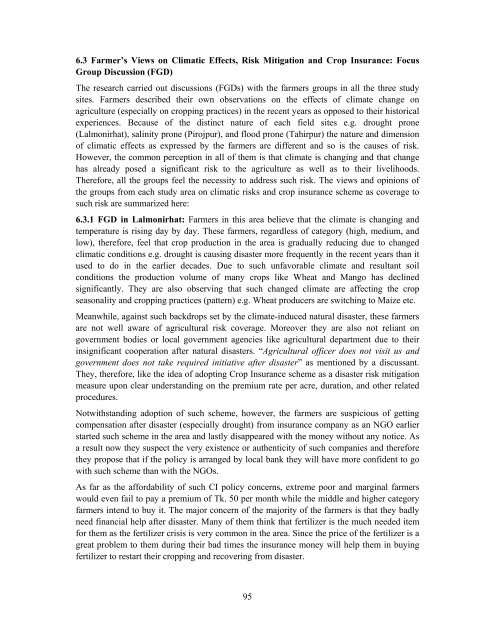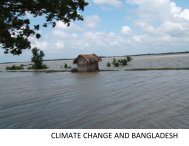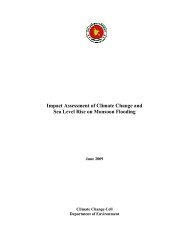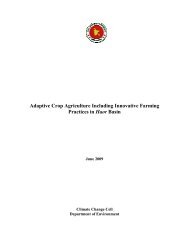Crop Insurance as a Risk Management Strategy in Bangladesh
Crop Insurance as a Risk Management Strategy in Bangladesh
Crop Insurance as a Risk Management Strategy in Bangladesh
You also want an ePaper? Increase the reach of your titles
YUMPU automatically turns print PDFs into web optimized ePapers that Google loves.
6.3 Farmer’s Views on Climatic Effects, <strong>Risk</strong> Mitigation and <strong>Crop</strong> <strong>Insurance</strong>: Focus<br />
Group Discussion (FGD)<br />
The research carried out discussions (FGDs) with the farmers groups <strong>in</strong> all the three study<br />
sites. Farmers described their own observations on the effects of climate change on<br />
agriculture (especially on cropp<strong>in</strong>g practices) <strong>in</strong> the recent years <strong>as</strong> opposed to their historical<br />
experiences. Because of the dist<strong>in</strong>ct nature of each field sites e.g. drought prone<br />
(Lalmonirhat), sal<strong>in</strong>ity prone (Pirojpur), and flood prone (Tahirpur) the nature and dimension<br />
of climatic effects <strong>as</strong> expressed by the farmers are different and so is the causes of risk.<br />
However, the common perception <strong>in</strong> all of them is that climate is chang<strong>in</strong>g and that change<br />
h<strong>as</strong> already posed a significant risk to the agriculture <strong>as</strong> well <strong>as</strong> to their livelihoods.<br />
Therefore, all the groups feel the necessity to address such risk. The views and op<strong>in</strong>ions of<br />
the groups from each study area on climatic risks and crop <strong>in</strong>surance scheme <strong>as</strong> coverage to<br />
such risk are summarized here:<br />
6.3.1 FGD <strong>in</strong> Lalmonirhat: Farmers <strong>in</strong> this area believe that the climate is chang<strong>in</strong>g and<br />
temperature is ris<strong>in</strong>g day by day. These farmers, regardless of category (high, medium, and<br />
low), therefore, feel that crop production <strong>in</strong> the area is gradually reduc<strong>in</strong>g due to changed<br />
climatic conditions e.g. drought is caus<strong>in</strong>g dis<strong>as</strong>ter more frequently <strong>in</strong> the recent years than it<br />
used to do <strong>in</strong> the earlier decades. Due to such unfavorable climate and resultant soil<br />
conditions the production volume of many crops like Wheat and Mango h<strong>as</strong> decl<strong>in</strong>ed<br />
significantly. They are also observ<strong>in</strong>g that such changed climate are affect<strong>in</strong>g the crop<br />
se<strong>as</strong>onality and cropp<strong>in</strong>g practices (pattern) e.g. Wheat producers are switch<strong>in</strong>g to Maize etc.<br />
Meanwhile, aga<strong>in</strong>st such backdrops set by the climate-<strong>in</strong>duced natural dis<strong>as</strong>ter, these farmers<br />
are not well aware of agricultural risk coverage. Moreover they are also not reliant on<br />
government bodies or local government agencies like agricultural department due to their<br />
<strong>in</strong>significant cooperation after natural dis<strong>as</strong>ters. “Agricultural officer does not visit us and<br />
government does not take required <strong>in</strong>itiative after dis<strong>as</strong>ter” <strong>as</strong> mentioned by a discussant.<br />
They, therefore, like the idea of adopt<strong>in</strong>g <strong>Crop</strong> <strong>Insurance</strong> scheme <strong>as</strong> a dis<strong>as</strong>ter risk mitigation<br />
me<strong>as</strong>ure upon clear understand<strong>in</strong>g on the premium rate per acre, duration, and other related<br />
procedures.<br />
Notwithstand<strong>in</strong>g adoption of such scheme, however, the farmers are suspicious of gett<strong>in</strong>g<br />
compensation after dis<strong>as</strong>ter (especially drought) from <strong>in</strong>surance company <strong>as</strong> an NGO earlier<br />
started such scheme <strong>in</strong> the area and l<strong>as</strong>tly disappeared with the money without any notice. As<br />
a result now they suspect the very existence or authenticity of such companies and therefore<br />
they propose that if the policy is arranged by local bank they will have more confident to go<br />
with such scheme than with the NGOs.<br />
As far <strong>as</strong> the affordability of such CI policy concerns, extreme poor and marg<strong>in</strong>al farmers<br />
would even fail to pay a premium of Tk. 50 per month while the middle and higher category<br />
farmers <strong>in</strong>tend to buy it. The major concern of the majority of the farmers is that they badly<br />
need f<strong>in</strong>ancial help after dis<strong>as</strong>ter. Many of them th<strong>in</strong>k that fertilizer is the much needed item<br />
for them <strong>as</strong> the fertilizer crisis is very common <strong>in</strong> the area. S<strong>in</strong>ce the price of the fertilizer is a<br />
great problem to them dur<strong>in</strong>g their bad times the <strong>in</strong>surance money will help them <strong>in</strong> buy<strong>in</strong>g<br />
fertilizer to restart their cropp<strong>in</strong>g and recover<strong>in</strong>g from dis<strong>as</strong>ter.<br />
95





